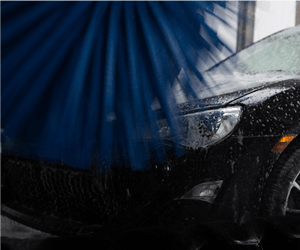
Data Driven
January 1, 2014
5 minute ReadAs featured in last Spring’s cover story, “Smarten Up,” car wash operators have joined the broader business-intelligence (BI) movement, harvesting data that can be analyzed to validate assumptions, spot emerging trends and predict the road ahead. BI has been embraced by political campaigns, sports teams and leading companies in virtually every business sector. Here’s a look at how some prominent car wash chains are getting in on the act.
BOOMERANG CARWASH
At Little Rock, Ark.-based Boomerang Carwash, data drives almost every decision made at the company’s 29 express car washes. Boomerang uses Innovative Control Systems point-of-sale cashier terminals that provide extensive data to the company’s accounting and information technology departments, which then create detailed monthly reports.
In addition, managers at each location perform weekly flow tests to ensure that just the right amount of chemicals is being used on each wash. Ed Colvard, Boomerang’s vice president of sales and marketing, said the company spends close to $1 million a year on chemicals, so if proper monitoring can reduce usage by 10 percent, that’s a meaningful impact on the bottom line.
And at the same time, analyzing the data ensures that enough chemicals are being used to maintain a high quality of wash.
“We’re so deep into data that it could spin your brain,” Colvard said. “I could tell you down to the one-hundredth of a milliliter how much chemical we dose per application, per car, per wash menu. We track all utilities — electric, water, the whole thing. We have a very deep financial analysis on everything we do.”
Colvard said Boomerang’s monthly reports rank its locations according to car count, revenue, ticket average, chemical usage by car, water usage by car, damage claims and cars per man hour.
Colvard said tracking cars per man hour is especially useful because it allows Boomerang to determine if it is overstaffing a location or if a low car count can be attributed to a lack of manpower. The statistic also can be used to determine if the chain should open a new location in an area where one or two of its existing facilities are performing especially well.
“We don’t want to have paralysis by analysis, and some of these reports are more detailed than we’d ever need,” Colvard said. “We have ranges that we look for with every metric that we have, and when a location gets out of that range, plus or minus, on any of these stats, then we turn the dogs loose, go in there and find out what’s going on.”
In years past, Boomerang offered as many as 22 free vacuum stations at a facility, but by analyzing data, the company learned that many customers will wash their car three or four times before using a vacuum, so the vacuum count can be reduced to about 10 without sacrificing service.
“We’ve gotten very little negative feedback, and it has saved us a lot of money in real estate, equipment and equipment maintenance,” Colvard said.
Boomerang also is working with its vacuum vendors to explore the possibility of making vacuums available to customers for a fee outside of normal operating hours. Colvard said the data suggest that Boomerang could generate $200 to $300 per month in revenue per vacuum when add-on features like shampoos and fragrances are factored in.
SPLASH CAR WASH
For Greenwich, Conn.-based Splash Car Wash, which operates 18 locations, one of the biggest appeals of Big Data is the ability to interact with customers in real time. Chief Executive Mark J. Curtis said his company uses MicroLogix dashboard software to monitor the performance of each location hour by hour, and when business is slow or inclement weather is expected, the company turns to social media to drive business.
Using Facebook and Twitter, Splash Car Wash might offer a 50 percent discount on a car wash or detailing package during slow periods.
“We can make a one-day or two-day offer that we would never make in any other circumstance, but there may be showers in the forecast, or business is extremely slow, so we may come out with a special deal,” Curtis said. “We can be in constant communication with our customers.”
Offers made through social media allow Splash Car Wash to encourage loyal customers to return sooner than they normally would, increasing the number of times a customer visits a location in a given year.
The real-time monitoring of data also allows Splash Car Wash to gauge the effectiveness of its crew. For example, if a staff member’s average ticket price is lower than desired, the company can alert the manager of that location immediately. “We can call the manager and prompt him to take notice and see if he can either switch out the service adviser or give the adviser a pep talk,” Curtis said.
MISTER CAR WASH
For Tucson, Ariz.-based Mister Car Wash, the largest car wash chain in the United States with 126 locations, leveraging Big Data is a key to staying on top. One of the company’s most important marketing efforts involves partnering with a company named Cardlytics to offer customers deals through their bank cards based on their purchase history.
For example, if a customer has never purchased a car detailing package or has never used Mister Car Wash’s lube service, Cardlytics can allow the company to offer a discount on those services through a customer’s bank card. The discount automatically is applied when a customer uses that card at the point of sale.
Mister Car Wash also has used a company named VeraCentra to build its internal data intelligence platform, which collects data similar to that of Boomerang Carwash.
Mister Car Wash can offer the deals through email or text message if a customer has provided that information, but since most customers don’t, a message on the receipt at the point of sale is the most common and effective way for Mister Car Wash to offer deals. Customers’ license plates are recorded at the time of sale, so Mister Car Wash can analyze their purchasing patterns and target customers with specific deals.
“We have a very high engagement rate with our email customers — a great [email] open rate, click-through rate and redemption rate,” said Sarah Mendez, Mister Car Wash’s marketing director. “A lot of that comes from sending the right offers and having the right cadence with messaging so that it’s not overwhelming or bombarding the customer. That’s a key component to the whole equation.
“Big Data is going to become more and more relevant for all of us, and customers have gotten smarter. We’re not in an age when some of the more traditional advertising methods are going to pay big dividends. Customers want relevant, engaging offers that are meaningful to them instead of some of the more blanket approaches that some of the traditional media allow for.”








